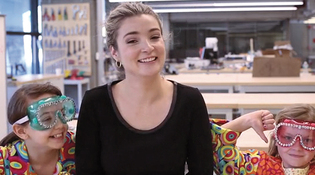 loading
loading
Light & VerityTo fund student projects, Yale looks to the crowdThe university launches a Kickstarter page for entrepreneurs and researchers.  KickstarterLab Candy founder Olivia Pavco-Giaccia ’16 raised money through a Yale kickstarter page. View full imageLike many Yale graduate students, Forestry and Environmental Studies student Mary Rogalski ’09MES, ’15PhD, was putting the final touches on grant applications in late 2012. But she was also hedging her bets by making a quirky video about lake pollution: Rogalski had decided to try crowdfunding through the #SciFund Challenge, a science-specific fund-raising campaign. After posting the video online—and spearheading a social-media push—Rogalski raised $2,026, just topping her goal of $2,000. “You can apply for lots of grants and funds, and you don’t get most of them,” Rogalski says. “I thought crowdfunding would be an interesting way to raise money and awareness, and also to share my project with a broader group.” Now, Yale is helping other students who want to finance original research and projects online. Last fall, the university launched a curated page on the crowdfunding website Kickstarter, becoming one of the first elite universities, along with Stanford and MIT, to facilitate crowdfunded projects. Ten projects have been featured on the Yale page to date, including a start-up that makes dress shirts out of organic cotton and an initiative to bring live Renaissance music to the university. “The page showcases the diversity of projects at Yale,” says Brita Belli, communications officer for Yale’s Office of Cooperative Research. “Having so many of these different projects in one place allows students or alumni to see that this is something that they can do.” One of their successes is Lab Candy, a company created by Olivia Pavco-Giaccia ’16 to encourage girls’ interest in science by selling colorful lab coats, goggles, storybooks, and other gear. In September, the Lab Candy page went live with a goal of raising $20,000 to ramp up production. Representatives from the university helped Pavco-Giaccia spread word of her project with press releases and a coordinated social media plan. By the time the campaign ended, Lab Candy had raised $31,035. Yale decided to partner with Kickstarter in the face of reduced funding through traditional avenues, says Lynn Fiellin ’96MD, an associate professor of medicine who helped start the project. “Crowdfunding can definitely raise money,” says Fiellin, “so what is the best way for a university to use those funds?” Although Yale’s Kickstarter page is dominated by entrepreneurial ventures like Lab Candy now, Fiellin believes that crowdfunding could also aid scientific research like Rogalski’s, especially with federal and state funds for research growing scarcer. But some in the scientific community point out that projects on sites like Kickstarter are not subject to peer review. “The way that research projects are typically reviewed by universities is quite rigorous. That’s not necessarily true for crowdfunded projects,” says Barbara Walker, director of research development at the University of California–Santa Barbara, who recently coauthored a paper on crowdfunding science research. “There is a little bit of ‘buyer beware’ when it comes to that.” Still, Fiellin is bullish on its potential for Yale students, faculty, and alumni. “There are challenges with all of this, but it’s hard to be critical of any level of money being raised,” she says. “What we’ve seen is that academic institutions are moving into this area very rapidly. And we’d like to be at the forefront.”
The comment period has expired.
|
|